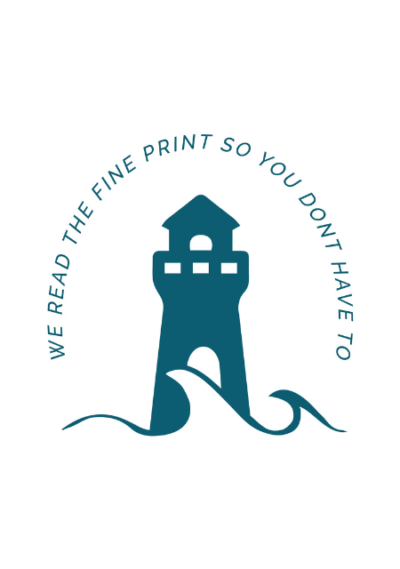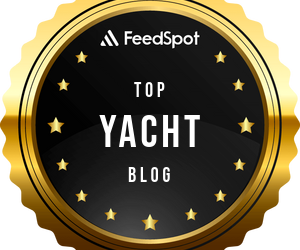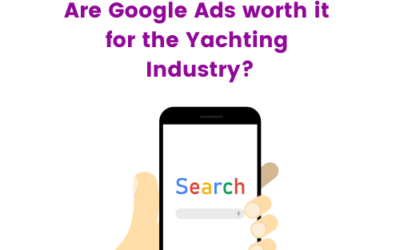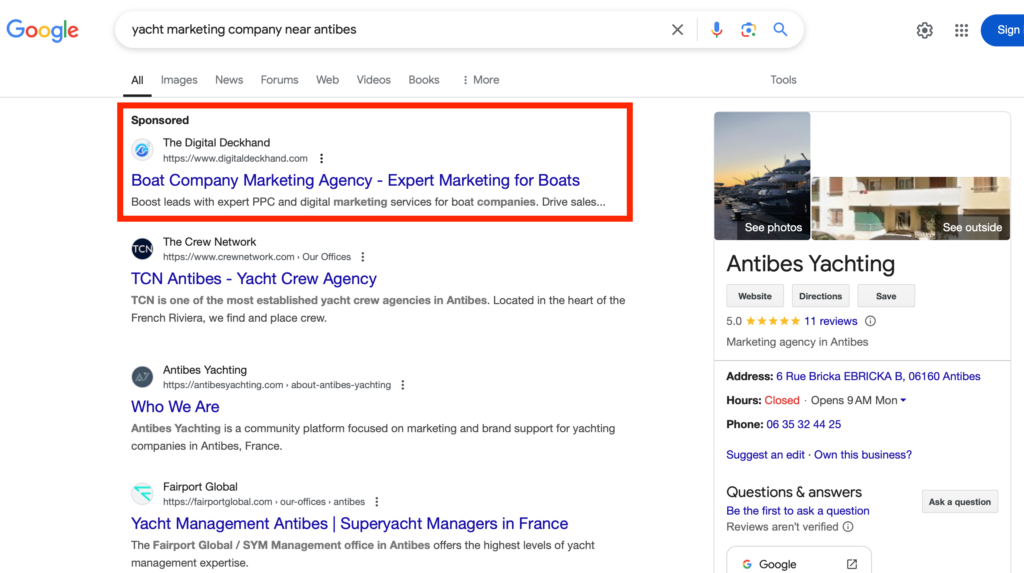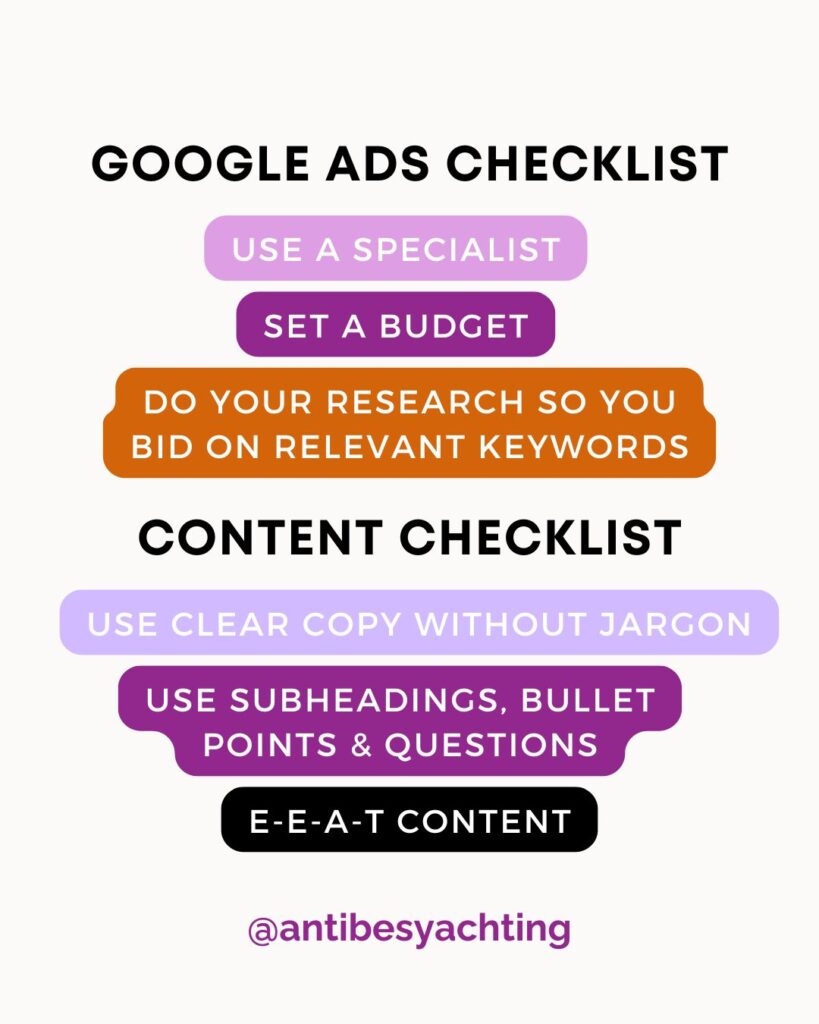Online Yachting Directory for Antibes
Find local products, services & suppliers for the yachting industry
Antibes Yachting goes beyond conventional business to connect you with opportunities and industry-specific advice.
Antibes Yachting Directory
Rebecca's skills in public relations have made her a well-known entity in yachting and luxury market places. I would not hesitate to put the future of my business in her hands, as I know that she would push it to be as successful as she possibly could. I highly recommend Rebecca and Antibes Yachting.
Rhea Rouw, Company Owner, Yachting International Radio
Rebecca is a natural talent when it comes to writing, she helped me with my website and everything she wrote was spot on. One appointment to discuss quickly the general idea of what I wanted and a few days later, the website was ready with Rebecca's texts. I couldn't have asked for a better/faster/more efficient service. I was totally satisfied and I can only recommend Antibes Yachting !
Jocelyn Passeron, Owner, TheYachtPhotographer.com
Rebecca's knowledge of the French Riviera is second to none. Her posts offer a truly exciting style and insights of huge benefit to anyone visiting the south of France. I would not hesitate to recommend Rebecca to anyone looking for a true "guru" on the ground on the Cote d'Azur or to add great content to their blog/website. She researches any subject thoroughly and always surprises me with her fantastic writing.
Alexander Coles, Charter Broker, Bespoke Yacht Charter
Rebecca was my first call when I needed some website copy. She worked meticulously through my requirements to understand how I wanted to present myself to the industry and provided some excellent copy that we edited a few times to get it just how I liked. A completely painless experience with a professional.
George ‘Ben’ Gill, Founder & Owner, Miller Compton Maritime
Rebecca is an excellent writer and a great collaborator who brings value to our brand and the yachting industry with passion and dedication.
Mavi Iglesias, SEA Yacht Group
Rebecca's marketing & PR skills are excellent and she has helped our business greatly, especially during a time of introducing our brand, products and services to the superyacht industry.
Daniel Bruntsch, Global Head of Marine, BROMIC Heating
We were delighted with the professional approach that Rebecca took with an article she wrote for us. We found her writing skills to be top tier, and the points that we were promoting were eloquently delivered. We were delighted with Rebecca's media connections meaning that we gained full exposure.
Paul Gray, Sales Director & Owner, Elite Superyacht Covers
Rebecca handled some marketing for my company and she was brilliant. What sets her apart is the heart she puts in her work. She is bright, positive and full of energy. She genuinely cares about your success and truly wants to see you thrive. This kind of dedication is priceless, especially these days when it feels like fewer people want to see you shine. I highly recommend her services!
Roberta Jubram, Owner, Jubram Yacht Interiors
List Your Business With Antibes Yachting To Reach More Customers
Latest News
The Balearic Superyacht Forum & Palma International Boat Show 2025 Guide
In this blog, I’ll cover both the Balearic Superyacht Forum and the Palma International Boat Show (PIBS).
The Balearic Superyacht Forum
Coinciding with Palma International Boat Show, the second edition of the Balearic Superyacht Forum will take place on April 29 and 30 at the Auditorium of Palma. I didn’t attend the debut edition last year, so I’m interested to see how the event is structured and the range of discussions on offer.
The Balearic Superyacht Forum is organised by the Balearic Marine Cluster, and is a strategic think tank that will focus on the future of superyachts in the Mediterranean. Topics will include marina infrastructure, refit sector expansion, environmental topics, and sustainable trends.
Networking and Industry Insights
The Balearic Superyacht Forum isn’t just about boats; it’s an event for networking and industry discussions. The show offers seminars and Hackathons covering ten topics related to yachting, providing targeted discussions about industry trends and innovations.
Here is more information about the ten Hackathon sessions. Participants can select one session to join with each taking one and a half hours.
- Cost Transparency & Budget Optimisation
Refit budgeting in the superyacht sector has long been unpredictable, with owners and managers facing unexpected overruns and vague cost breakdowns. Unlike the aviation or hospitality industries, the yachting world still suffers from inconsistent invoicing and a lack of financial clarity, eroding trust between shipyards, contractors, and yacht owners.
This hackathon will explore how the industry can bring structure and accountability to the budgeting process. Collaborative dscussions will examine industry best practices for cost forecasting, ways to define project scopes in advance, and strategies to minimise unpleasant surprises at the final invoice stage.
Participants will work towards frameworks that ensure transparency at every step — from initial quotes to final invoicing.
2. Expanding Superyacht Infrastructure
As yachts grow larger and more advanced, global refit and maintenance facilities are struggling to keep pace — particularly in the Mediterranean, where capacity is already stretched thin. Increasing wait times and logistical bottlenecks are forcing vessels to look further afield for service and maintenance facilities.
In this session, discussions will rethink infrastructure strategies. From optimising existing space and berth allocation to exploring sustainable shipyard expansions, participants will map out scalable solutions to meet growing demand. Other points will cover data-driven scheduling, temporary service points, and modular facility expansion. The goal: ensure that infrastructure growth keeps up with fleet evolution, safeguarding both service quality and industry sustainability.
3. Optimising Subcontractor Management
Refit projects rely on a huge network of subcontractors — from specialists in engineering and interiors to composite and paint experts to electricians. Yet, without proper coordination, this complex network often leads to delays, disputes, and inconsistent quality.
This hackathon aims to discuss how shipyards can centralise subcontractor management, implement real-time communication tools, and create accountability systems that improve overall efficiency.
Participants will brainstorm solutions like performance tracking, streamlined invoicing, and better-defined workflows with the aim to create a roadmap for smoother refit operations and higher-quality outcomes for owners and managers alike.
4. Enhancing Customer Experience in Refit
For many yacht owners and captains, the refit process feels like a step down from the luxury service they’re accustomed to. Confusing updates, delayed timelines, and unclear costs disrupt what should be a seamless experience.
This hackathon will explore how we can improve the client journey during refit projects. Discussions will focus on aligning expectations, real-time project tracking, automated updates, and tools for design visualisation that keep clients informed and confident in the process.

The 2nd edition of The Balearic Superyacht Forum will take place at the Auditorium of Palma on April 29 and 30, 2025
5. Cybersecurity in the yachting sector
As superyachts become increasingly connected, they’ve become highly attractive targets for cyberattacks. Navigation systems, onboard networks, and sensitive owner data are all vulnerable, and the industry still lacks consistent cybersecurity standards to protect them.
In this hackathon, participants will discuss how to integrate cybersecurity protocols into both new builds and existing yachts, manage third-party access, and promote continuous monitoring to detect threats early. Crew training, layered network security, and alignment with insurance and regulatory frameworks will all be on the table for discussion.
The goal is clear: protect owners, guests, and crew by building a cyber-resilient yachting industry before an inevitable major attack forces action.
6. Next-Gen Antifouling & Environmental Compliance
Anti-fouling solutions balance between performance and environmental impact and this fine line is getting tighter.
As the ocean temperatures rise and biofouling hull colonisation increases, superyacht anti-fouling performance finds itself at a tipping point: reaching a balance between efficacy, sustainability, and human health.
This hackathon will explore the current regulatory landscape — from the European Biocidal Products Regulation (BPR) to IMO guidance — and its implications for manufacturers, shipyards, and yacht owners. With all anti-fouling formulations locked by the BPR until at least 2029, the challenge is clear: maintain effectiveness in harsher marine conditions.
Participants will discuss the current anti-fouling technologies, emerging solutions, parameters for tailored coating schemes, maintenance and how can we collectively drive a shift that balances environmental responsibility, performance expectations, spread of invasive species and commercial viability.
7. Upskilling The Superyacht Workforce
The superyacht sector faces an acute talent shortage. As experienced professionals retire and new technologies emerge, the need for skilled workers has never been more urgent. From revitalising apprenticeships to forging partnerships with technical schools, this hackathon focuses on solutions to attract, train, and retain the next generation of talent.
Attendees will also discuss how to position the sector as an attractive career option for young professionals, offering modern workplace culture, growth opportunities, and establishing clear career pathways.
8. Enhancing Communication & Marketing In Yachting
This is the Hackathon I have registered for. This session will discuss how the yachting industry struggles to communicate its true value. Public perception often focuses on excess rather than economic impact, job creation, or sustainability efforts.
This session will dive into how we can reshape the narrative, such as proactive storytelling, community engagement, and modern marketing tactics that go beyond luxury clichés.
Participants will collaborate on ways to promote the technical excellence and positive contributions of the sector, creating a unified voice that resonates with policymakers, media, and the wider public.
9. Eco-friendly Marinas & Renewable Energy Solutions
Marinas consume enormous amounts of energy, yet many rely heavily on outdated, fossil-fuel-based systems. As hybrid and electric yachts gain traction, the gap between sustainability goals and marina capabilities widens.
This session will explore how marinas can become energy self-sufficient, integrating solar, wind, and smart grids to reduce emissions and operational costs. Points of discussion will highlight practical steps like expanding shore power infrastructure, developing hydrogen or biofuel bunkering, and creating business models that attract eco-conscious yacht owners.
It will be interesting to hear feedback from this session. Many shipyards are investing in R&D for alternative biofuels, propulsion and new tech, however based on the actual build numbers of electric and/or hybrid yachts in 2024 it seems the industry is far from proposed targets for alternative fuels and renewable energy.
10. Improving Waste & Water Management in Marinas
Water waste and pollution remain some of the most critical — and overlooked — challenges in marina operations. From excessive potable water use to poor waste managment, the current approach is neither sustainable nor efficient.
This hackathon will explore scalable solutions such as seawater filtration, rainwater harvesting, and smart monitoring systems to improve environmental compliance. Discussions will also focus on how the industry can better tackle waste management systems for greywater, bilge water, and hazardous materials. The objective is clear: move marinas from reactive to proactive environmental management, ensuring long-term sustainability and regulatory alignment.
Again, feedback will be interesting. Here on the French Riviera, waste management differs by marina.
There are over 100 companies attending so it appears to be an excellent opportunity to connect with key stakeholders and stay informed about the latest developments in the superyacht sector.
See the full programme and list of speakers at the Balearic Superyacht Forum here: https://thebalearicsuperyachtforum.com
Palma International Boat Show 2025
From April 30 to May 3, 2025, Palma de Mallorca’s Marina Moll Vell will transform into the Mediterranean’s yachting epicentre. Celebrating its 41st anniversary, the show organised by the Regional Ministry of Business, Employment and Energy, through the Regional Development Agency of the Balearic Islands (ADR Balears), and the Balearic Yacht Brokers Association (BYBA) promises to be a great event for industry professionals, yacht owners, and enthusiasts alike.
According to a study carried out by the Government of the Balearic Islands, last year PIBS generated an economic impact of €20.1 million. The impact study certifies that PIBS improves tourism by one month of the low season, boosting the flow of national and international tourists and income for hotels, restaurants, transport and shops.

Palma International Boat Show is a fantastic show for industry networking, seminars and market insights.
Expanded Exhibition Space
This year’s PIBS will present two different exhibition areas – El Moll Vell and Club de Mar – connected by sea thanks to the addition of a new area of 5,000 square metres located in the Club de Mar. The new area of the Club de Mar will provide a space for boats between 40 and 100 metres in length, mainly sailboats, from single-model shipyards.
On land, there will be an exhibition area with service and equipment companies for this type of yacht, such as repair and maintenance industries, naval engineering, boatbuilding and interior design etc.
With over 295 exhibitors, the show will feature the latest in brokerage, charter, yacht design, equipment, and services, making it a must-visit for anyone in the maritime sector.
Palma Superyacht Village
The Superyacht Village, formerly known as the Palma Superyacht Show, will showcase some of the best 24m+ superyachts currently on the international brokerage and charter market. Another huge attraction is the Village’s wide array of shore-side exhibitors, showcasing anything from the latest advancements in sail design to next-level marine electronics.
The Superyacht Village also includes a dedicated Refit & Repair zone that targets the yachting industry’s experts and professionals featuring exhibitors including Spectro Jet-Care, Superyacht Rubbish and Idea Data Solutions.
The Superyacht Square
The Superyacht Square is a small dedicated zone focused on startups, innovation, sustainability and crew. The Innovation Corner occupies a spacious outdoor zone, with networking events and good foot traffic. Companies that will be present there include Yachting Ventures, Swiss Ocean Tech Ltd, ACREW, Otter, and La Purative.
Superyacht New Build Hub
Located at the newly renovated Club de Mar, the Superyacht New Build Hub is connected to the main show via boat shuttle and golf cart. Note: The transfer dock is located at the floating bridge at Palma Superyacht Village between the Varadero Area and Muelle de los Pescadores. With 21 premium berths for superyachts ranging from 35m to 80m, this hub is a unique zone for shipyards to present their new builds and groundbreaking projects.
The New Build Hub will also feature Foundation Zero’s container, presenting all the details of the 68.9m Project Zero, currently under construction at Vitters with naval architecture by Dykstra Naval Architects. Project Zero will operate without any combustion engines and will produce zero emissions.
Yachts on Display
While full details of available yachts at PIBS will be published only very close to the event, visitors can expect to see a wide range of yachts, from chic day boats to high performance sailing vessels.
Some vessels present will include the 37.5-metre Escapade on display by Superyacht Partners with exterior design and naval architecture by Dubois Naval Architects, M/Y Lemon not Lime, a Riva who will be exhibited by Ocean Independence and the historic 1946 Cassiopeia. Moravia Yachting will showcase the debut of 26-metre St Barth 85 Fly by St Barth Yachting.
Sub-events during Palma Boat Show:
Don’t miss registering for the breakfasts, stopping by for a sunset drink and dropping in to listen to the seminars as part of the “Thallasophilia” sub-programme with Estela Yachting and the Port Authority of the Balearics.
Yachting Ventures will host an opening party on April 30 from 4pm-7pm at Superyacht Square.
The Superyacht Charities Seafarers Supper will host their annual PIBS fundraiser at Restaurant ca n’Eduardo on May 2nd so grab a ticket for that.
PIBS Information:
Dates: April 30 to May 3
Opening times: 10 am to 8 pm
To see the list of participating yachts, exhibitors and maps for PIBS 2025, go to: https://palmainternationalboatshow.com/en/
#TBSF25 #PIBS #palmasuperyachtvillage #palmainternationalboatshow25
Antibes Yachting named in ‘Top Yachting Blogs in 2025’
Antibes Yachting’s blog has been selected by Feedspot as one of the “Top 90 Yacht Blogs & Websites in 2025”.
I make a consistent effort to post useful and industry-relevant content to my blog, so I’m happy that Antibes Yachting is included in this latest list of top yachting blogs to follow. Antibes Yachting plays a crucial role in offering valuable insights into marketing, communication, and business growth within the yachting industry.
My expertise in creating content that addresses both the creative and business sides of yachting, along with a focus on the latest trends and best practices for marketing, sets my site apart.
The Antibes Yachting ‘Blog/News’ section features :
- Blogs focused on marketing strategies, luxury branding and communication tips for the yachting industry
- Destination information about visiting or living in Antibes, crew news and updates about Port Vauban
- Superyacht news such as regulatory updates, new technologies, yachting business
- Local events and yachting news on the French Riviera and in Monaco
- Boat show news and industry event updates
- Interviews with industry professionals covering a range of topics such as diversity in yachting, sustainability or ocean conservation
- Yachting sector market analysis and trends
Topics we don’t write about:
- Brokerage services, yacht sales and ownership advice
- Gear reviews
- Sailing techniques
- Accidents, sinkings, collisions, yacht fires
Check out Feedspot’s full list of top yachting-related blogs to follow in 2025 by clicking on the link here: https://bloggers.feedspot.com/yacht_blog/
We do accept guest blogs that are relevant to our audience for a small fee, please email us to discuss the contributor guidelines and rates. Email: info@antibesyachting.com
Are Google Ads Worth It For The Yachting Industry?
By Rebecca Whitlocke
There are plenty of yachting advertising agencies and media buying companies that target the yachting industry, so it’s important to understand if Google Ads are effective and how the right targeting can match your yacht (or products and services) with qualified buyers.
Revenue-driven Google Ad campaigns should have a strategy, but I see so many yachting companies throwing away tens of thousands of euros every month due to poor ad campaigns.
There are plenty of people stating they are an expert at boat advertising, or a marketing specialist for yachting – when they’re not. Two years ago, I was called in to help a superyacht supplier who couldn’t understand why they were spending between €3000 and €5000 per month on Google Ads and only getting a low number of leads. By low number, I mean the results were so bad – about 5 qualified leads – that once I went into the backend of their campaigns I quickly realised that the person they’d employed to run and manage their Google Ad campaigns had no expertise or knowledge how to set up or run an effective campaign. This ‘expert’ had duped them on their CV, and falsely stated they had previous experience managing revenue-driven advertising. The client lost around €15,000 before they called me to clean everything up. Expensive lesson. Within two weeks, I had reduced their Google Ad spend by 84%, whilst increasing their revenue by – yes, those zeros are not an error!
This is why if you choose to include Google Ads in your digital marketing strategy you need to work with a specialist who can demonstrate an in-depth knowledge of audience research, lead generation, targeting, understanding SEO, yachting-specific keyword research, bid strategies, demographics, location-specific yacht marketing and more.
Using Google Ads To Market Your Yachting Company
What Does A Google Ad Look Like?
Google Ads Tips for Yachting Companies
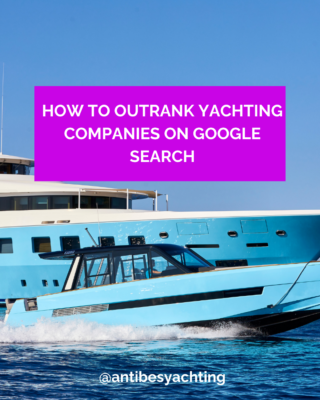
Tips for Google Ad campaigns in yachting
Identify Your Goals and Choose A Google Ads Campaign Type
Clarify whether your priority is app downloads, brand awareness, direct sales. or lead generation. From that, you can choose the campaign type that aligns with where your target customer spends their time online.
There are five types of Google Ads campaign:
- Google Search ads: Targets users actively searching for products or services via Google’s search engine. They appear on Google’s search engine results pages (SERPs).
- Google Display ads: Reaches users browsing websites related to your products or services. These ads are ideal for enhancing brand awareness and retargeting visitors.
- Google Shopping ads: These show your product listings directly in Google Shopping. These ads are ideal for ecommerce businesses wanting to display their products.
- Google Video ads: Connects with users watching related videos on YouTube. Excellent for visual storytelling. Video ads are ideal for brands looking to engage users with video content.
- Google App ads: Promotes mobile apps across Google’s platforms. App ads are ideal for mobile app developers and businesses with an app-centric customer engagement model.
Focus On Keyword Research
Type in a general search keyword related to your business, choose the location you’re targeting, and hit “Search”. Now, here’s where the magic happens. When the search results display, look at the “Intent” column.The letters in this column represent four different types of search intent:
- Informational (I): “What is the safest life jacket for small children?” The user is looking for information about life jackets.
- Navigational (N): “Yachting Marketplace life jackets.” The user wants life jackets from a specific brand or store, or even a certain page.
- Commercial (C): “Top-rated life jackets for jet skis.” The user wants to research life jackets before making a purchase.
- Transactional (T): “Buy life jackets online.” The user wants to buy life jackets.
Focus strongly on the keywords with commercial and transactional intent for your Google advertising campaigns because they are targeting prospects who are ready to purchase.
📌OTHER KEYWORD TOOLS TO USE:
Google Keyword Planner
Google Analytics
Ubersuggest
Spyfu
Make sure you group your keywords into ad groups and campaigns with similar themes.
Use Negative Keywords In Your Google Ads Set Up

Create Audience Segments & Connect Your Google Analytics (GA4) To Google Ads
Setting up audience segments in Google Analytics (GA4) makes it easier to track their online behaviour and target them in your Google ads. For example, you can use Audiences to create segments of users :
- By demographics: age, gender, income etc
- By hobbies & interests: browsing behaviours, hobbies, lifestyle choices etc
- By location: city, region, country
- By past interactions with your business: such as they signed up for your yachting newsletter, they bought something from your e-commerce pages, or they looked online at a specific yachting blog post, product page, or sales page.
You can modify all these conditions with a time span. For instance, you can create an audience specifying who viewed a certain page, such as yacht charter listing in Monaco or a yacht engine part, within the last week. This feature helps ensure your audiences are current—not filled with prospective customers who’ve already moved on.
Audience segmentation is a powerful feature when linked to your Google Ads account, because you can remarket to these people. For the steps to link your Google Analytics account to your Google Ads account, refer to this help guide from Google: https://support.google.com/analytics/answer/9379420?hl=en#zippy=%2Cin-this-article
Write Yachting-Specific Ad Copy
Use Geo-targeting For Better Google Ad Results
Think About Creating Relevant Landing Pages For Your Google Ads
Use AI and Smart Bidding For Your Google Ad Campaigns
Use Tools to Help Your Google Ads Performance & Market Research
Market Finder (Think with Google): https://marketfinder.thinkwithgoogle.com/intl


